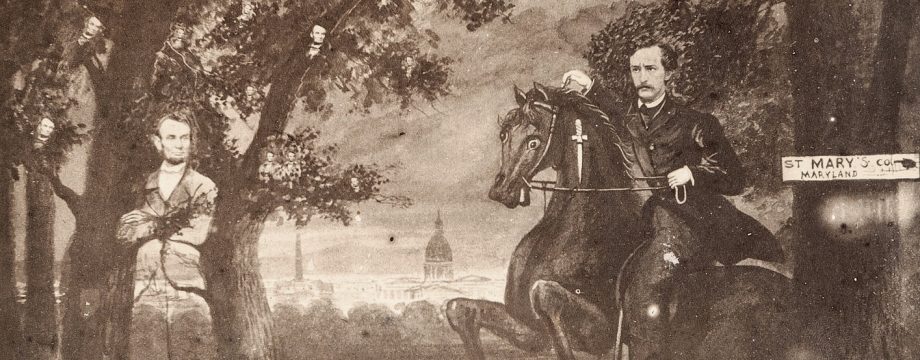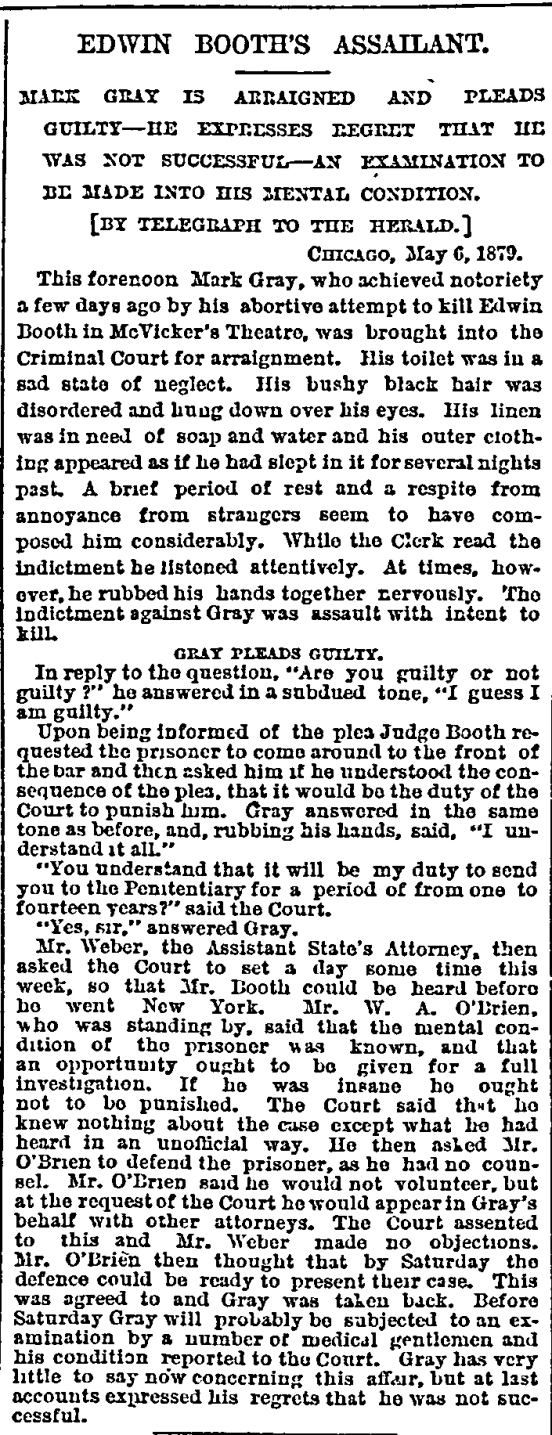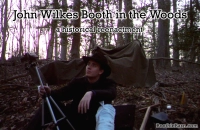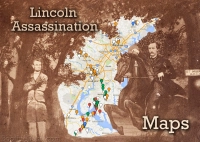As I wrote two days ago, Edwin Booth was the target of an assassination attempt on April 23, 1879 while he was performing Richard II at McVicker’s Theatre in Chicago. Since two days ago was the anniversary of the attempt, I wanted to put up a quick post highlighting what I considered a mere piece of historical trivia. The more I looked into it however, the more I found myself quickly engulfed in a huge amount of information that is available far beyond what I have read in books. My inspiration for this post was Nora Titone’s Edwin/John Wilkes biography, My Thoughts Be Bloody which devotes a paragraph to the incident. While looking for a bit more background I read about the incident in Eleanor Ruggles’ Prince of Players and Stanley Kimmel’s The Mad Booths of Maryland. These sources gave about a page to the incident. I decided to look at the newspaper sources of the day, and it is from those that I was deluged with information. This attempt on Edwin’s life was a national story. The coverage on it all quickly reminded me of how talented and celebrated Edwin Booth truly was. We all know that newspapers take liberties with the truth from time to time and that we cannot trust them with certainly. Nevertheless, what follows is a look at the aftermath of the attempt on Edwin’s life and the fate of his assassin.
First allow me to summarize the scene of the assassination ttempt, this time pulling from newspaper sources, rather than the books mentioned above.
In April of 1879, Edwin Booth was at McVicker’s Theatre in Chicago for an engagement. McVicker’s was owned by James H. McVicker, the step-father of Edwin’s second wife, Mary McVicker. She was backstage during that night’s performance. As always, the accounts of the day differ somewhat regarding what happened during the final act of Richard II. The last scenes of the act are set in the prison of Pomfret castle where King Richard is shown cut off from the world. The stage is darkened during this scene, with little more than a pale light masquerading as moonlight shining through a small grated window on the prison flat. Booth, as Richard, was sitting on stage soliloquizing of his isolation. Meanwhile, a man who sat in the second balcony about 30 feet from Booth, was removing a pistol he had concealed in his sleeve. In his left hand, he was said to be holding a copy of the play. He followed along with Booth’s soliloquy, waiting for the right time to act. While speaking onstage, Booth heard a shot ring out.

Booth and the audience remained unmoved; the audience thinking the anachronistic gunshot was the result of an error backstage and Booth thinking an accident prone cowboy had discharged his gun by mistake. When a second shot rang out about three seconds later, Booth arose (or was in the process of rising when the second shot happened) and proceeded to walk calmly towards the direction of the shots. Before walking off of the stage and into the audience, Booth pointed to the left hand upper gallery and men around the assailant grabbed at the man with the revolver, preventing him from firing again. Booth went into his dressing room to comfort his wife, Mary, who was in a state of great distress after hearing the shots.
It was written that had it not been for the swift response from police officers the assailant would have been, “rather roughly handled” by the rest of the audience when they became aware of what had occurred. The man was seized by the officer of the theatre and James Morgan, a detective who was in the audience. Morgan put handcuffs on the man who gave him little resistance. As Morgan led the man to Chicago’s Central Station, he heard him say, “I don’t see how I happened to miss him,” and, “I am sorry that I didn’t take some lessons in pistol practice before I tried this thing.”
 When searched at Central Station a .32 caliber “True Blue” revolver with three loaded chambers and two chambers containing exploded shells was found on him. Along with some trivial items (scissors, pawn ticket, pocket knife) the man was found to have a stub for a seat at McVicker’s from the night before, April 22nd. In addition, the man had this letter on him:
When searched at Central Station a .32 caliber “True Blue” revolver with three loaded chambers and two chambers containing exploded shells was found on him. Along with some trivial items (scissors, pawn ticket, pocket knife) the man was found to have a stub for a seat at McVicker’s from the night before, April 22nd. In addition, the man had this letter on him:
“Chicago, April 22, 1879.
Dear Katie:
Forgive these brief but horrible lines, I left St. Louis Monday evening. The firm I was with would not increase my salary, so I made up my mind to return to Keokuk, but being a lover of fine acting I came to Chicago to see Booth, but I was sadly mistaken. It would take Booth one year of constant acting to compete with Lawrence Barrett’s Richelieu. Tonight he plays Richard II. Katie, if I go tonight he will kill me or I will him. In all Shakespeare’s works I find but one man to compete with Booth, and that is Iago. My judgment ought to foretell me that since I call Booth Iago he could no more play Richelieu than the devil could be an angel. I don’t know what to do. Every line I write I prance the floor as though I was playing Hamlet. I’m sorry I came here, for I think the hangman has a rope for me. Remember me to your mother and sister.”
The man had seen Edwin Booth act before, and seemingly did not believe he was worthy of any of his accolades. The letter was signed, “Yours Truly, Mark Gray”. The name of the failed assassin was known.
When asked, he refused to state his reasons for wanting to kill Edwin Booth, but claimed that when they were made known, they would be deemed sufficient to all.
The next morning, April 24th, Edwin Booth was present when Mark Gray was taken before a judge:
It was found that Gray had purchased the revolver used in the shooting only the day before and clearly showed no skill as to its use. Mark Gray was a young man, 26 years of age (though he stated to police he was 23) and was said to bear a striking resemblance to Edwin Booth if not for his mustache.
Theories abounded regarding Gray’s motive behind his attempted assassination of Edwin. Gray’s own ambiguity when questioned only fueled the fire in the nation’s newspapers. Here are a few published theories for the attempt on Booth’s life, some serious, others humorous:
While people hypothesized about Gray’s motives, more information was being found regarding his background and character:
Finding no answers in the newspaper accounts and the interviews others had with Gray, Edwin Booth decided to meet with Gray himself and ask him what drove his attempt on his life:
Perhaps desiring the attention for a longer period of time, Gray did not reveal his reasons to Booth at this time.
On May 6th, Mark Gray was brought into court for arraignment and gave a surprising plea:
Wanting to make sure Edwin Booth was present for the proceedings of the trial before departing Chicago for his next engagement, the pendulum of justice moved swiftly for Mark Gray. On May 10th his trial began, and it was here that he finally revealed his reasoning for attempting to kill Edwin Booth.
The mere word “mark”, recited by Edwin Booth as Richelieu and King Richard was the cause for the actor’s misery. The vocalization of this simple English word which is a homograph for a name, and the way in which Booth portrayed his characters, incensed Mark Gray to the point of madness. As stated, Gray was immediately sent to the Northern Illinois Hospital and Asylum for the Insane in Elgin, IL.
Though Gray was locked away, Edwin Booth kept a cautious eye on his would be assassin and wrote the following note to a Chicago attorney a month after Gray was put in the Elgin asylum:
“I trust that our friend Gray may become gray indeed – yea postiviely hoary-headed – in kind but careful confinement, or if earlier released, that his exit may be from this earthly stage of his dramatic exploits to that celestial scene where idiots cease from shooting and actors are at rest. If he be ever again at liberty my own life I shall not value worth a rush. But I hope the Elgin guardians will not be deceived by his seeming helplessness.”
Edwin Booth would be able to sleep easy for a little over three years. Then, in October of 1882, Mark Gray’s friends made a plea for his release:
On November 6, 1882, Gray was successful in his plea:
Though I have not been able to find an account of Edwin’s reaction to the release of his would be assassin, we can surmise that he was not pleased by the relatively short amount of time Mark Gray spent locked up.
In a worrisome sign of mental relapse, Gray jumped into the spotlight again trying to cash in on his infamy:
If Gray ever did play Hamlet, it was just to his neighbors in Keokuk, Iowa. For many years, Mark Gray was forgotten. When Edwin Booth died in 1893, Gray’s attempt was mentioned in a sentence on various newspaper biographies on his life. Just a little over 10 years later, in May of 1904, Mark Gray Lyons died at the age of 51. While Booth’s obituaries contained mentions of Mark Gray, there was a distinct lack of Booth in Mark Gray’s official obituary:
Unsurprisingly a bachelor his whole life, Mark Gray was buried with his sister and her husband in the Catholic section of Keokuk’s Oakland Cemetery.
To me Mark Gray Lyons is Edwin Booth’s Mark David Chapman. Gray wanted the fame and life of Edwin Booth. He tried to convince others and himself that he was Edwin Booth’s son. He wanted to be a star of the stage and resented Edwin for the success he had. After the shooting that night in 1879, Edwin Booth returned to the stage and finished Richard II. James McVicker found one of the bullets behind one of the stage flats it had passed through and he gave it to Edwin Booth. Booth later had it set in a gold cartridge and engraved upon it, “From Mark Gray to Edwin Booth, April 23, 1879.” Edwin was above all else, a devoted tragedian and, as history shows, nothing could keep him off that stage for long:
References:
My Thoughts Be Bloody by Nora Titone
Prince of Players by Eleanor Ruggles
The Mad Booths of Maryland by Stanley Kimmel
The Staff of the Keokuk Public Library
Countless newspaper articles garnered from GenealogyBank.com


















well done, man.
Another great post! However, you mentioned Edwin died of natural causes which is incorrect. His health was in decline for many years due to his tobacco use etc. Referencing another excellent post by you: http://boothiebarn.com/2012/10/18/the-end-of-edwin/
You are correct, Carolyn. Edwin did sort of do himself in with his tobacco use. But I guess that’s still more of a natural cause than two bullets would have been.
Thanks for putting it up on Spirits of Tudor Hall!
Great background story on the newly adjudged lunatic!
Now get out to Iowa, Rich, and get me a picture of his grave.
This was all very interesting – thanks for digging it out.
Actually the man thought Booth to be his father and he wanted money. Just got back from Ford’s this day, it’s not like it used to be. I know more than any of their rangers. But there are good ones, you just never know who you will get.
I just discovered your blog. What a great job! Fascinating stuff here. Thank you for sharing!
Pingback: Edwin Booth at the Trial | BoothieBarn
As a member of The Players and a dramaturg, I so much appreciate this blog. You often reveal facts that augments other evidence as well as offering opinions based upon whatever evidence you may find, which I think is a singular mark of a good historian.
Thank you for your compliments, John. Though I don’t know you, I am humbled by your words. Give my best to The Players, it’s a remarkable organization and some day I hope to see Edwin’s masterpiece for myself.
Pingback: Grave Thursday: Mark Gray Lyons | BoothieBarn
Pingback: When John Wilkes Booth's brother saved the life of Abraham Lincoln's son - HistoryColored